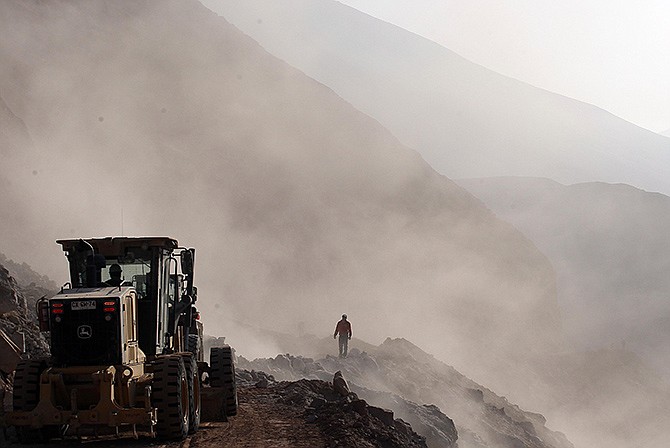TRIPOLI, Lebanon (AP) - Yahya was trapped in his hometown for two years by Syria's civil war, moving from house to house to avoid shells and bullets. His father was killed by a sniper. His family then fled to another town that came under a fierce government offensive.
When the teenager finally made it out of the country with his mother and two sisters, he became the latest sad statistic of the sectarian conflict: the one-millionth refugee to register in Lebanon.
The United Nations' refugee agency, which invited reporters to witness Yahya's registration and allowed them to interview the 19-year-old, described the 1 million figure as a "devastating milestone" for Lebanon.
There are many more Syrians inside Lebanon than those officially registered, with the Lebanese government itself estimating that at least a half-million are unregistered.
The UNHCR says it is registering an average of more than one refugee a minute in Lebanon, a country of 4.5 million that is seeing its resources strained by the new arrivals.
"I feel sad because this means that 1 million fled here before me to suffer together," Yahya said as he waited to register with the UNHCR in the northern city of Tripoli.
"A million is a big number for Syria and a big number for Lebanon," he added. Yahya asked to be identified only by his first name because he feared that Syrian authorities would retaliate against his relatives who are still there.
Yahya told a harrowing story of how his family became caught up in the violence between troops loyal to Syrian President Bashar Assad and rebels seeking his ouster. Their house in the central city of Homs was on the front line of the conflict that began in March 2011, forcing them out.
They moved frequently for their safety, Yahya said, but his father was shot to death by a sniper in September of that year.
They were finally evacuated from Homs earlier this year by the U.N., and traveled to Yabroud, a rebel-held town near the Lebanese border that soon came under government attack.
On March 8, the family crossed into Lebanon, first looking for shelter for a few days in the overcrowded border town of Arsal. They moved farther west to an informal settlement outside Tripoli.
"We didn't know where to go. We just wanted to get away from all the shelling and fighting," Yahya said.
The conflict in Syria, which had a population of 23 million before the civil war, has killed more than 150,000 people.
The U.N. estimates there are more than 2.5 million Syrians registered in neighboring countries - nearly 670,000 in Turkey, nearly 590,000 in Jordan and about 220,000 in Iraq. More than 47,700 are awaiting registration.
Lebanon has the highest per-capita concentration of refugees recorded anywhere in the world in recent history, the UNHCR said.
"For us, the one-millionth refugee is a devastating marker," said Ninette Kelley, UNHCR representative in Lebanon. She said that in publicizing Thursday's milestone, the U.N. agency wants "the world to see what it means to individuals, being torn apart by the Syrian conflict," but also to "show what a tremendous burden the Lebanese people are bearing."
The Lebanese government provides none of the facilities and land that Turkey, Jordan and Iraq have allocated for the refugees. Many Syrians in Lebanon live in appalling conditions, finding shelter in slums, tents and tin shacks strung with laundry lines and wedged between farms.
On a casual walk in Beirut, Syrians can be seen sheltering in underground parking garages, under bridges and in old construction sites with no running water, sanitation, electricity or protection from the weather. Nearly half of the refugees are children.
The World Bank estimates that the Syria crisis cost Lebanon $2.5 billion in lost economic activity in 2013 and threatens to push 170,000 Lebanese into poverty by the end of this year, the UNHCR said.
Along with the social and economic strain, Syria's sectarian war has also frequently spilled into Lebanon with deadly clashes between factions supporting opposing sides in the fighting.
Militants from Lebanon's Shiite militant group Hezbollah are fighting alongside Assad's forces in Syria, while many among Lebanon's Sunni population support the rebels.
The U.N. and its partner agencies have mounted an unprecedented appeal to raise funds for both refugees and Lebanese host communities. The U.N. has asked for $1.89 billion in 2014, but only $242 million has been received so far, Kelley said.
For Yahya and his family, there was no place to go but Lebanon.
"We were looking around to go somewhere else in Syria, but no place is safe," he said.
While he is relieved his family made it out of Syria, the prospect of being dependent on U.N. food aid to survive is daunting for Yahya. After his father's death, he became the sole provider for the family, and jobs are hard to find.
He and his relatives get $30 a month each, which is barely half the $250 rent he has to pay for a shack in an informal settlement in nearby Dinniyeh.
"Every day in Lebanon it's going from bad to worse," Yahya said. "We can't even hope that tomorrow will be better."

